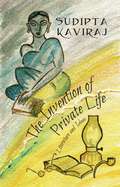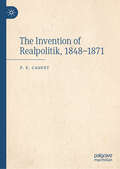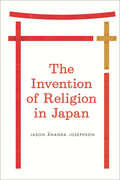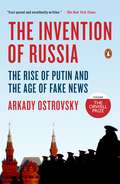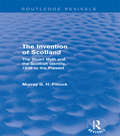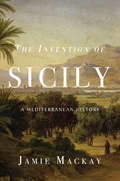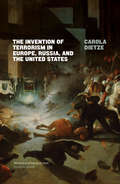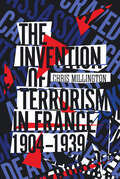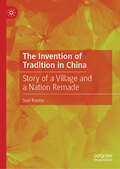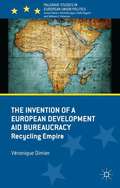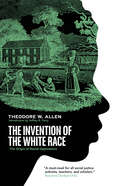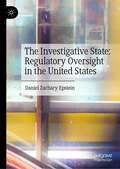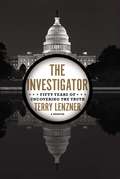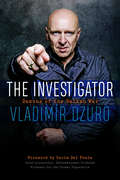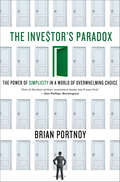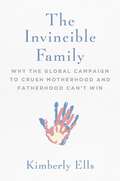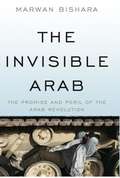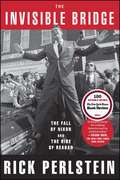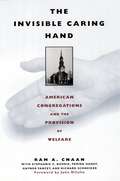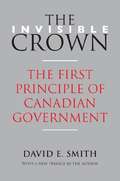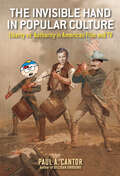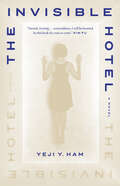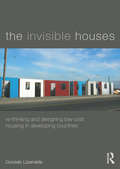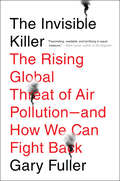- Table View
- List View
The Invention of Private Life: Literature and Ideas
by Sudipta KavirajThe essays in this volume, which lie at the intersection of the study of literature, social theory, and intellectual history, locate serious reflections on modernity's complexities in the vibrant currents of modern Indian literature, particularly in the realms of fiction, poetry, and autobiography. Sudipta Kaviraj shows that Indian writers did more than adopt new literary trends in the nineteenth and twentieth centuries. They deployed these innovations to interrogate fundamental philosophical questions of modernity. Issues central to modern European social theory grew into significant themes within Indian literary reflection, such as the influence of modernity on the nature of the self, the nature of historicity, the problem of evil, the character of power under the conditions of modern history, and the experience of power as felt by an individual subject of the modern state. How does modern politics affect the personality of a sensitive individual? Is love possible between intensely self-conscious people, and how do individuals cope with the transience of affections or the fragility of social ties? Kaviraj argues that these inquiries inform the heart of modern Indian literary tradition and that writers, such as Bankimchandra Chattopadhyay, Rabindranath Tagore, and Sibnath Sastri, performed immeasurably important work helping readers to think through the predicament of modern times.
The Invention of Realpolitik, 1848–1871
by P. E. CaquetWhat is Realpolitik? How did the concept come about, and what does it stand for? This book explores the origins and meaning of a core precept of international history and politics. Statesmen, diplomats, and analysts alike deploy the term as if it were a timeless label. Endlessly, they suppose, states compete with each other for power in a zero-sum game. Yet Realpolitik was born in Germany in the mid-nineteenth century. The circumstances of its birth are key to its meaning. Realpolitik emerged among Europe’s constitutional struggles on the one hand, and the wars of Italian and German unification on the other. Revolutionary disappointment, the end of the Romantic era, and the rise of a new scientific materialism all informed a Realist period of political strongmen. Rather than describing a permanent state of things, this book suggests, Realpolitik is rooted in nineteenth-century European and German politics, and consequently the rise of an aggressive nationalism.
The Invention of Religion in Japan (Elecronic Resource Ser.)
by Jason Ananda JosephsonThroughout its long history, Japan had no concept of what we call OC religion. OCO There was no corresponding Japanese word, nor anything close to its meaning. But when American warships appeared off the coast of Japan in 1853 and forced the Japanese government to sign treaties demanding, among other things, freedom of religion, the country had to contend with this Western idea. In this book, Jason Ananda Josephson reveals how Japanese officials invented religion in Japan and traces the sweeping intellectual, legal, and cultural changes that followed. aMore than a tale of oppression or hegemony, JosephsonOCOs account demonstrates that the process of articulating religion offered the Japanese state a valuable opportunity. In addition to carving out space for belief in Christianity and certain forms of Buddhism, Japanese officials excluded Shinto from the category. Instead, they enshrined it as a national ideology while relegating the popular practices of indigenous shamans and female mediums to the category of OC superstitionsOCOOCoand thus beyond the sphere of tolerance. Josephson argues that the invention of religion in Japan was a politically charged, boundary-drawing exercise that not only extensively reclassified the inherited materials of Buddhism, Confucianism, and Shinto to lasting effect, but also reshaped, in subtle but significant ways, our own formulation of the concept of religion today. This ambitious and wide-ranging book contributes an important perspective to broader debates on the nature of religion, the secular, science, and superstition.
The Invention of Russia: The Rise of Putin and the Age of Fake News
by Arkady OstrovskyWINNER OF THE 2016 ORWELL PRIZEFINANCIAL TIMES BOOK OF THE YEARA highly original narrative history by The Economist's Moscow bureau chief that does for modern Russia what Evan Osnos did for China in Age of Ambition The end of communism and breakup of the Soviet Union was a time of euphoria around the world, but Russia today is violently anti-American and dangerously nationalistic. So how did we go from the promise of those heady days to the autocratic police state of Putin's new Russia? The Invention of Russia is a breathtakingly ambitious book that reaches back to the darkest days of the cold war to tell the story of the fight for the soul of a nation. With the deep insight only possible of a native son, Ostrovsky introduces us to the propagandists, oligarchs, and fixers who have set Russia's course since the collapse of the Soviet Union, inventing a new and more ominous identity for a country where ideas are all too often wielded like a cudgel. The Soviet Union yoked together dreamers and strongmen--those who believed in an egalitarian ideal and those who pushed for an even more powerful state. The new Russia is a cynical operation, where perpetual fear and war are fueled by a web of lies, as television presenters peddle the invasion of Ukraine and goad Putin to go nuclear. Twenty-five years after the Soviet flag came down over the Kremlin, Russia and America are again heading toward a confrontation--but this course was far from inevitable. With this riveting account of how we got here--of the many mistakes and false promises--Ostrovsky emerges as Russia's most gifted chronicler.From the Hardcover edition.
The Invention of Scotland: The Stuart Myth and the Scottish Identity, 1638 to the Present (Routledge Revivals)
by Murray G. PittockA dynasty of high ability and great charm, the Stuarts exerted a compelling fascination over their supporters and enemies alike. First published in 1991, this title assesses the influence of the Stuart mystique on the modern political and cultural identity of Scotland. Murray Pittock traces the Stuart myth from the days of Charles I to the modern Scottish National Party, and discusses both pro- and anti-Union propaganda. He provides a unique insight into the ‘radicalism’ of Scottish Jacobitism, contrasting this ‘Jacobitisim of the Left’ with the sentimental image constructed by the Victorians. Dealing with a subject of great relevance to modern British society, this reissue provides an extensive analysis of Scottish nationhood, the Stuart cult and Jacobite ideology. It will be of great interest to students of literature, history, and Scottish culture and politics.
The Invention of Sicily: A Mediterranean History
by Jamie MackayA fascinating cultural history of this most magical of islandsSicily has always acted as a gateway between Europe and the rest of the world. Fought over by the Phoenicians and Greeks, the Romans, Goths and Byzantines, Arabs and Normans, Germans, Spanish and the French for thousands of year, Sicily became a unique melting pot where diverse traditions merged, producing a unique heritage and singular culture.In this fascinating account of the island from the earliest times to the present day, author and journalist Jamie Mackay leads us through this most elusive of places. From its pivotal position in the development of Greek and Roman mythology, and the beautiful remnants of both the Arab and Norman invasions, through to the rise of the bandits and the Cosa Nostra, The Invention of Sicily is the perfect companion to the culture and history of Sicily.Mackay weaves the political and social development of the island in with its fascinating cultural heritage - in doing so discussing how great works including Lampedusa's masterpiece The Leopard and its film adaptation by Visconti, and the novels of Leonardo Sciascia, among many others, have both been shaped by Sicily's past, and continue to shape it into the present.
The Invention of Terrorism in Europe, Russia, and the United States
by Carola DietzeTerrorism's roots in Western Europe and the USAThis book examines key cases of terrorist violence to show that the invention of terrorism was linked to the birth of modernity in Europe, Russia and the United States, rather than to Tsarist despotism in 19th century Russia or to Islam sects in Medieval Persia. Combining a highly readable historical narrative with analysis of larger issues in social and political history, the author argues that the dissemination of news about terrorist violence was at the core of a strategy that aimed for political impact on rulers as well as the general public. Dietze's lucid account also reveals how the spread of knowledge about terrorist acts was, from the outset, a transatlantic process. Two incidents form the book's centerpiece. The first is the failed attempt to assassinate French Emperor Napoléon III by Felice Orsini in 1858, in an act intended to achieve Italian unity and democracy. The second case study offers a new reading of John Brown's raid on the arsenal at Harpers Ferry in 1859, as a decisive moment in the abolitionist struggle and occurrences leading to the American Civil War. Three further examples from Germany, Russia, and the US are scrutinized to trace the development of the tactic by first imitators. With their acts of violence, the "invention" of terrorism was completed.Terrorism has existed as a tactic since then and has essentially only been adapted through the use of new technologies and methods.
The Invention of Terrorism in France, 1904-1939
by Chris MillingtonThe Invention of Terrorism in France, 1904-1939 investigates the political and social imaginaries of "terrorism" in the early twentieth century. Chris Millington traces the development of how the French conceived of terrorism, from the late nineteenth-century notion that terrorism was the deed of the mad anarchist bomber, to the fraught political clashes of the 1930s when terrorism came to be understood as a political act perpetrated against French interests by organized international movements. Through a close analysis of a series of terrorist incidents and representations thereof in public discourse and the press, the book argues that contemporary ideas of terrorism in France as "unFrench"—that is, contrary to the ideas and values, however defined, that make up "Frenchness"—emerged in the interwar years and subsequently took root long before the terrorist campaigns of Algerian nationalists during the 1950s and 1960s. Millington conceptualizes "terrorism" not only as the act itself, but also as a political and cultural construction of violence composed from a variety of discourses and deployed in particular circumstances by commentators, witnesses, and perpetrators. In doing so, he argues that the political and cultural battles inherent to perceptions of terrorism lay bare numerous concerns, not least anxieties over immigration, antiparliamentarianism, representations of gender, and the future of European peace.
The Invention of Tradition in China: Story of a Village and a Nation Remade
by Suvi RautioIn China, heritage projects are sprouting across the countryside carrying the promise of Xi Jinping’s “Chinese dream” as a call for the great revival and rejuvenation of the nation. This book unravels the workings behind these promises through the story of remaking Meili, a Dong ethnic minority village nestled along the margins of China, into a “Traditional Village” heritage site. In a past riven by deep political and societal disruptions, Meili becomes a medium for contesting, mediating and continuously inventing representations of tradition that aligns with the Chinese Communist Party’s mission towards continuity and stability. The outcome is an original depiction of the compromises that shape heritage-making in a rural ethnic corner of China. Filled with rich, fine-grained narrative and analysis, Suvi Rautio offers a unique lens to the politics of inventing tradition and its far-reaching consequences in steering China's national identity under Xi Jinping rule.
The Invention of a European Development Aid Bureaucracy: Recycling Empire (Palgrave Studies in European Union Politics)
by Véronique DimierA comprehensive analysis of how European development policy was shaped, this book explores the role of former colonial officials in shaping the policy agenda and explores this example of 'recycled empire.' Dimier argues that this post-colonial agenda only changed as a result of pressure from the OECD and World Bank in the 1980s and 1990s.
The Invention of the White Race: The Origin of Racial Oppression (The\invention Of The White Race Ser. #1)
by Theodore W. AllenWhen the first Africans arrived in Virginia in 1619, there were no &“white&” people there; nor, according to colonial records, would there be for another sixty years. Historical debate about the origin of racial slavery has focused on the status of the Negro in seventeenth-century Virginia and Maryland. However, as Theodore W. Allen argues in this magisterial work, what needs to be studied is the transformation of English, Scottish, Irish and other European colonists from their various statuses as servants, tenants, planters or merchants into a single new all-inclusive status: that of whites. This is the key to the paradox of American history, of a democracy resting on race assumptions.Volume One of this two-volume work attempts to escape the &“white blind spot&” which has distorted consecutive studies of the issue. It does so by looking in the mirror of Irish history for a definition of racial oppression and for an explanation of that phenomenon in terms of social control, free from the absurdities of classification by skin color. Compelling analogies are presented between the history of Anglo-Irish and British rule in Ireland and American White Supremacist oppression of Indians and African-Americans. But the relativity of race is shown in the sea change it entailed, whereby emigrating Irish haters of racial oppression were transformed into White Americans who defended it. The reasons for the differing outcomes of Catholic Emancipation and Negro Emancipation are considered and occasion is made to demonstrate Allen&’s distinction between racial and national oppression.
The Investigative State: Regulatory Oversight In The United States
by Daniel Zachary EpsteinThis book is a timely examination of congressional oversight in the United States, serving as a definitive guide for scholars and political, legal, and media observers seeking to navigate contemporary conflicts between Congress and the White House. Author Daniel Epstein has spent his professional career as a lawyer serving all sides of the regulatory process: he ran investigations for Congress, defended the White House from congressional oversight, and represented individuals, nonprofit news organizations, and entrepreneurs in federal court to fight for regulatory transparency and fairness. Epstein uses historical and observational data to argue that the modern federal bureaucracy did not begin as a regulatory state but as an investigative state. The contemporary picture of Congress having empowered the bureaucracy to set policy through rules is a relatively recent development in the political development of administrative law. The book’s novel econometric models and historical analyses force a shift in how legal scholars and judges understand delegation, congressional oversight, and agency investigations.
The Investigator
by Terry LenznerThe Los Angeles Times once called investigative lawyer Terry Lenzner "one of the most powerful and dreaded private investigators in the world. ” In his fifty-year career, Lenzner has worked with politicians, celebrities, governments, and corporations worldwide; with a steadfast commitment to the truth, he has uncovered facts that have shaped policy and influenced major legal battles. In this captivating memoir, Lenzner speaks about his varied career and high-profile cases for the first time. At the Justice Department in 1964, he investigated the murder of three civil rights workers-an infamous event that inspired the film Mississippi Burning. He led the national Legal Services Program for the poor, prosecuted organized crime in New York, defended peace activist Philip Berrigan, and represented CIA operative Sid Gottlieb. As a counsel to the Senate Watergate Committee, Lenzner investigated Nixon’s dirty tricks and followed the money trail that led to the Watergate burglary and cover-up. He was the first person to deliver a congressional subpoena to a sitting U. S. president. He uncovered cost overruns of the Alaska oil pipeline, helped identify the Unabomber, investigated the circumstances of Princess Diana’s death, and cleared Hugo Chavez of false corruption charges. Lenzner also worked with President Clinton’s defense team during the impeachment hearings. The Investigator is a riveting personal account: Lenzner astounds with anecdotes of scandal and intrigue, offers lessons in investigative methods, and provides an eye-opening look behind some of the most talked-about media stories and world events of our time. .
The Investigator: Demons of the Balkan War
by Vladimír DzuroThe war that broke out in the former Yugoslavia at the end of the twentieth century unleashed unspeakable acts of violence committed against defenseless civilians, including a grizzly mass murder at an Ovčara pig farm in 1991. An international tribunal was set up to try the perpetrators of crimes such as this, and one of the accused was Slavko Dokmanović, who at the time was the mayor of a local town. Vladimír Dzuro, a criminal detective from Prague, was one of the investigators charged with discovering what happened on that horrific night at Ovčara. The story Dzuro presents here, drawn from his daily notes, is devastating. It was a time of brutal torture, random killings, and the disappearance of innocent people. Dzuro provides a gripping account of how he and a handful of other investigators picked up the barest of leads that eventually led them to the gravesite where they exhumed the bodies. They were able to track down Dokmanović, only to find that taking him into custody was a different story altogether. The politics that led to the war hindered justice once it ended. Without any thoughts of risk to their own personal safety, Dzuro and his colleagues were determined to bring Dokmanović to justice. In addition to the story of the pursuit and arrest of Dokmanović, The Investigator provides a realistic picture of the war crime investigations that led to the successful prosecution of a number of war criminals. Visit warcrimeinvestigator.com for more information or watch a book trailer.
The Investor's Paradox: The Power of Simplicity in a World of Overwhelming Choice
by Brian PortnoyInvestors are in a jam. A troubled global economy, unpredictable markets, and a bewildering number of investment choices create a dangerous landscape for individual and institutional investors alike. To meet this challenge, most of us rely on a portfolio of fund managers to take risk on our behalves. Here, investment expert Brian Portnoy delivers a powerful framework for choosing the right ones – and avoiding the losers.Portnoy reveals that the right answers are found by confronting our own subconscious biases and behavioral quirks. A paradox we all face is the natural desire for more choice in our lives, yet the more we have, the less satisfied we become – whether we're at the grocery store, choosing doctors, or flipping through hundreds of TV channels. So, too, with investing, where there are literally tens of thousands of funds from which to choose. Hence "the investor's paradox": We crave abundant investment choices to conquer volatile markets, yet with greater flexibility, the more overwhelmed and less empowered we become.Leveraging the fresh insights of behavioral economics, Portnoy demystifies the opaque world of elite hedge funds, addresses the limits of mass market mutual funds, and discards the false dichotomy between "traditional" and "alternative" investments. He also explores why hedge funds have recently become such a controversial and disruptive force. Turns out it's not the splashy headlines – spectacular trades, newly minted billionaires, aggressive tactics – but something much more fundamental. The stratospheric rise to prominence and availability of alternative strategies represents a further explosion in the size and complexity of the choice set in a market already saturated with products. It constitutes something we all both crave and detest.The Investor's Paradox lights a path toward simplicity in a world of dangerous markets and overwhelming choice. Written in accessible, jargon-free language, with a healthy skepticism of today's money management industry, it offers not only practical tools for investment success but also a message of empowerment for investors drowning in possibility.
The Invincible Family: Why the Global Campaign to Crush Motherhood and Fatherhood Can't Win
by Kimberly EllsIn this shocking report, Kimberly Ells tells the story of earth's oldest institution—the family—in a way it has never been told before. The Invincible Family challenges current social doctrines, unmasks the annihilation of womanhood in the name of "women's empowerment," and exposes the efforts of United Nations agencies to advance "sexual rights" for children. The Invincible Family is both a call to arms to defend the most essential human institution in its darkest hour and a rich source of encouragement. Kimberly Ells is a researcher on family policy and has spoken at the United Nations and around the country on international threats to children and the family. A graduate of Brigham Young University, she is married and the mother of five children.
The Invisible Arab: The Promise and Peril of the Arab Revolutions
by Marwan BisharaThe Invisible Arabtraces the roots of the revolutions in the Arab world. Marwan Bishara, chief policy analyst of Al Jazeera English and the anchor of the program "Empire”, combines on-the-ground reporting, extensive research and scholarship, and political commentary in this book on the complex influences that made the revolutions possible. Bishara argues that the inclusive, pluralistic nationalism that motivated the revolutions are indispensable to their long-term success. The Invisible Arabis a voyage in time from the Arab world’s 'liberation generation’ through the 'defeated' and 'lost generations', arriving at today’s 'miracle generation'. Bishara unpacks how this new generation, long seen as a demographic bomb, has proved to be the agent of progress, unity and freedom. It has in turn used social networks to mobilize for social justice. Bishara discusses how Israel, oil, terrorism and radical Islam have affected the interior identity of the region as well as Western projections upon it. Protection of Israel, Western imperial ambition, a thirst for oil, and fear of radicalism have caused many Western regimes and media to characterize Arab countries and people as unreceptive to democracy or progress. These ideas are as one-dimensional as they are foolhardy. Bishara argues that the Arab revolutions present a great window of opportunity for reinventing and improving Arab ties with the rest of the world- notably the West-on the basis of mutual respect and mutual interest. The revolutions will be judged by how they realize freedom and justice, and how they can pave the way for reconciling and accommodating nationalism and Islam with democracy. Bishara argues that these pillars-liberty and justice reconciled with religion and nationalism, form the bedrock that will allow stability and progress to flourish in the Arab world and beyond.
The Invisible Bridge: The Fall of Nixon and the Rise of Reagan
by Rick PerlsteinFrom the bestselling author of Nixonland: a dazzling portrait of America on the verge of a nervous breakdown in the tumultuous political and economic times of the 1970s.In January of 1973 Richard Nixon announced the end of the Vietnam War and prepared for a triumphant second term--until televised Watergate hearings revealed his White House as little better than a mafia den. The next president declared upon Nixon's resignation "our long national nightmare is over"--but then congressional investigators exposed the CIA for assassinating foreign leaders. The collapse of the South Vietnamese government rendered moot the sacrifice of some 58,000 American lives. The economy was in tatters. And as Americans began thinking about their nation in a new way--as one more nation among nations, no more providential than any other--the pundits declared that from now on successful politicians would be the ones who honored this chastened new national mood. Ronald Reagan never got the message. Which was why, when he announced his intention to challenge President Ford for the 1976 Republican nomination, those same pundits dismissed him--until, amazingly, it started to look like he just might win. He was inventing the new conservative political culture we know now, in which a vision of patriotism rooted in a sense of American limits was derailed in America's Bicentennial year by the rise of the smiling politician from Hollywood. Against a backdrop of melodramas from the Arab oil embargo to Patty Hearst to the near-bankruptcy of America's greatest city, The Invisible Bridge asks the question: what does it mean to believe in America? To wave a flag--or to reject the glibness of the flag wavers?
The Invisible Caring Hand: American Congregations and the Provision of Welfare
by Ram CnaanPopular calls to transform our current welfare system and supplant it with effective and inexpensive faith-based providers are gaining political support and engendering heated debate about the separation of church and state. Yet we lack concrete information from which to anticipate how such initiatives might actually work if adopted. Despite the assumption that congregations can help many needy people in our society, it remains to be seen how extensive they wish their involvement to be, or if they have the necessary tools to become significant providers in the social service arena. Moreover, how will such practices, which will move faith-based organizations towards professionalization, ultimately affect the spirit of volunteerism now prevalent in America's religious institutions? We lack sufficient knowledge about congregational life and its ability to play a key role in social service provision. The Invisible Caring Hand attempts to fill that void. Based on in-depth interviews with clergy and lay leaders in 251 congregations nationwide, it reveals the many ways in which congregations are already working, beneath the radar, to care for people in need. This ground-breaking volume will provide much-sought empirical data to social scientists, religious studies scholars, and those involved in the debates over the role of faith-based organizations in faith-based services, as well as to clergy and congregation members themselves.
The Invisible Crown
by David E. SmithThe Crown is not only Canada's oldest continuing political institution, but also its most pervasive, affecting the operation of Parliament and the legislatures, the executive, the bureaucracy, the courts, and federalism. However, many consider the Crown to be obscure and anachronistic. David E. Smith's The Invisible Crown was one of the first books to study the role of the Crown in Canada, and remains a significant resource for the unique perspective it offers on the Crown's place in politics.The Invisible Crown traces Canada's distinctive form of federalism, with highly autonomous provinces, to the Crown's influence. Smith concludes that the Crown has greatly affected the development of Canadian politics due to the country's societal, geographic, and economic conditions. Praised by the Globe and Mail's Michael Valpy as "a thoroughly lucid, scholarly explanation of how the Canadian constitutional monarchy works," it is bolstered by a new foreword by the author speaking to recent events involving the Crown and Canadian politics, notably the prorogation of Parliament in 2008.
The Invisible Hand in Popular Culture: Liberty vs. Authority in American Film and TV
by Paul A. Cantor“Analyzes how ideas about economics and political philosophy find their way into everything from Star Trek to Malcolm in the Middle.” —Wall Street JournalPopular culture often champions freedom as the fundamentally American way of life and celebrates the virtues of independence and self-reliance. But film and television have also explored the tension between freedom and other core values, such as order and political stability. What may look like healthy, productive, and creative freedom from one point of view may look like chaos, anarchy, and a source of destructive conflict from another. Film and television continually pose the question: Can Americans deal with their problems on their own, or must they rely on political elites to manage their lives?In this groundbreaking work, Paul A. Cantor—whose previous book, Gilligan Unbound, was named one of the best nonfiction books of the year by the Los Angeles Times—explores the ways in which television shows such as Star Trek, The X-Files, South Park, and Deadwood and films such as The Aviator and Mars Attacks! have portrayed both top-down and bottom-up models of order. Drawing on the works of John Locke, Adam Smith, Alexis de Tocqueville, and other proponents of freedom, Cantor contrasts the classical liberal vision of America?particularly its emphasis on the virtues of spontaneous order?with the Marxist understanding of the “culture industry” and the Hobbesian model of absolute state control.The Invisible Hand in Popular Culture concludes with a discussion of the impact of 9/11 on film and television, and the new anxieties emerging in contemporary alien-invasion narratives: the fear of a global technocracy that seeks to destroy the nuclear family, religious faith, local government, and other traditional bulwarks against the absolute state.
The Invisible Hotel: A Novel
by Yeji Y. HamA work of literary horror in the gothic tradition, The Invisible Hotel is a startling, speculative tale of political and ideological adolescence in the long afterlife of the Korean War.Yewon dreams of a hotel. In the hotel, there are infinite keys to infinite rooms—and a quiet terror she is desperate to escape. When Yewon wakes, she sees her life: a young woman, out of her job at a convenience store, trapped in the tiny South Korean village of her birth, watching her mother wash the bones of their ancestors in their decrepit bathtub. Every house has them, these rotting and fragmented bones, reminders of what they have all lost to a war that never seems to end. Yewon and her siblings were born in this bathtub—and every year women give birth to new babies in the bathtub. Now, Yewon&’s brother is stationed near the North Korean border, her sister has just undergone a life-changing tragedy, and her mother is constantly worried, her health declining. In crisis and in stasis, Yewon&’s dreams of the decrepit hotel lead her to an unsettling truth about her country&’s collective heritage.Recalling international trailblazers like Han Kang&’s The Vegetarian and Yoko Ogawa&’s The Memory Police, The Invisible Hotel marks the arrival of a singular new voice with a sharp social acumen.
The Invisible Hotel: A Novel
by Yeji Y. HamA work of literary horror in the gothic tradition, The Invisible Hotel is a startling, speculative tale of political and ideological adolescence in the long afterlife of the Korean War.Yewon dreams of a hotel. In the hotel, there are infinite keys to infinite rooms—and a quiet terror she is desperate to escape. When Yewon wakes, she sees her life: a young woman, out of her job at a convenience store, trapped in the tiny South Korean village of her birth, watching her mother wash the bones of their ancestors in their decrepit bathtub. Every house has them, these rotting and fragmented bones, reminders of what they have all lost to a war that never seems to end. Yewon and her siblings were born in this bathtub—and every year women give birth to new babies in the bathtub. Now, Yewon&’s brother is stationed near the North Korean border, her sister has just undergone a life-changing tragedy, and her mother is constantly worried, her health declining. In crisis and in stasis, Yewon&’s dreams of the decrepit hotel lead her to an unsettling truth about her country&’s collective heritage.Recalling international trailblazers like Han Kang&’s The Vegetarian and Yoko Ogawa&’s The Memory Police, The Invisible Hotel marks the arrival of a singular new voice with a sharp social acumen.
The Invisible Houses: Rethinking and designing low-cost housing in developing countries
by Gonzalo LizarraldeWinner of the ACSA/AIA Housing Design Education Award! There is an increased interest among architects, urban specialists and design professionals to contribute to solve "the housing problem" in developing countries. The Invisible Houses takes us on a journey through the slums and informal settlements of South Africa, India, Colombia, Honduras, El Salvador, Cuba, Haiti and many other countries of the Global South, revealing the challenges of, and opportunities for, improving the fate of millions of poor families. Stressing the limitations of current approaches to housing development, Gonzalo Lizarralde examines the short-, mid- and long-term consequences of housing intervention. The book covers – among others – the issues of planning, design, infrastructure and project management. It explains the different variables that need to be addressed and the causes of common failures and mistakes, while outlining successful strategies based on embracing a sustained engagement with the complexity of processes that are generally invisible.
The Invisible Killer: The Rising Global Threat of Air Pollution-and How We Can Fight Back
by Gary FullerAn urgent examination of one of the biggest global crises facing us today--air pollution--looking at the drastic worsening of the problem, and what we can do about it."Fascinating, readable, and terrifying in equal measure." —Mark Lynas, author of Six DegreesThe air pollution that we breathe every day is largely invisible—but it is killing us. How did it get this bad, and how can we stop it? Far from a modern-day problem, scientists were aware of the impact of air pollution as far back as the seventeenth century. Now, as more of us live in cities, we are closer than ever to pollution sources, and the detrimental impact on the environment and our health has reached crisis point. The Invisible Killer will introduce you to the incredible individuals whose groundbreaking research paved the way to today's understanding of air pollution, often at their own detriment. Gary Fuller's global story examines devastating incidents from London's Great Smog to Norway's acid rain; Los Angeles's traffic problem to wood-burning damage in New Zealand. Fuller argues that the only way to alter the future course of our planet and improve collective global health is for city and national governments to stop ignoring evidence and take action, persuading the public and making polluters bear the full cost of the harm that they do. The decisions that we make today will impact on our health for decades to come. The Invisible Killer is an essential book for our times and a cautionary tale we need to take heed of.
